Annual Review
2022
Amongst the key highlights of the year, the expansion of Nasdaq Dubai’s crypto currencies offering, and investment opportunities supported by its open, progressive, and innovative ecosystem that enables leading investment and fund management companies globally to venture into the Middle East and North Africa (MENA) markets. We welcomed the listing of the 21Shares’s physically backed Bitcoin Exchange Traded Product in 2022, building upon the previous year’s successes as Nasdaq Dubai debuted the crypto currencies funds trading in the region with the dual-listing of 3iQ’s ‘The Bitcoin Fund’, the first listed digital asset-based fund in the MENA region.
Similarly, Nasdaq Dubai witnessed a momentous year in terms of new bonds and Sukuk listings for local, regional, and international issuers, corporate and sovereign alike, reinforcing Dubai’s position as one of the leading listing venues for fixed income instruments with a total value of US$ US$ 117.3 billion, including US$ 36.1 billion of bonds and US$ 81.2 billion of Sukuk.
We are enhancing our market infrastructure and product offering by leveraging Dubai’s comprehensive capital markets ecosystem.
Performance Highlights
February
- Nasdaq Dubai started the year with the listing of Dubai Islamic Bank’s US$ 750 million Sukuk. The successful issuance reflected market confidence in DIB which is the largest financial services Sukuk issuer on Nasdaq Dubai.
- The same month also witnessed the listing of a USD 100 million bond by the Capital Bank of Jordan.
April
- Listing of US$ 750 million Sukuk by the Emirate of Sharjah
- Listing of US$ 1.6 billion Sukuk by Islamic Development Bank
May
- Nasdaq Dubai welcomed the listing of the first Dirham-denominated treasury bonds (T-Bonds) issued by the UAE Federal Government acting through the Ministry of Finance (MoF). Two bonds with a total value of AED 1.5 billion were listed. His Excellency Mohammed bin Hadi Al Hussaini, Minister of State for Financial Affairs, rang the market-opening bell to celebrate the listing of the Government of UAE T- Bonds on Nasdaq Dubai.
June
- Nasdaq Dubai welcomed 9 debt listings in June 2022. The listing activity was mainly dominated by carbon neutrality themed bonds by Industrial and Commercial Bank of China Limited (ICBC), Sukuk by Government of Indonesia, and UAE MoF T-Bonds. Listings included:
- Five-tranche carbon-neutrality-themed bonds worth a total amount of US$ 2.68 billion by ICBC. These tranches were issued by ICBC’s branches in the Dubai International Financial Centre (DIFC), Hong Kong, London and Singapore. ICBC Dubai (DIFC) Branch listed CNH 2 billion note, the largest CNH-denominated public bond issued within the ICBC Group. The other tranches included EUR 300 million note, HKD 2 billion note, USD 1.2 billion note, and US$ 600 million note.
- Sukuk issuances with a total value of USD 3.25 billion through two tranches by the Government of Indonesia. This included a tranche of USD 1.5 billion issued to finance eligible SDG expenditure with green and blue focus.
- Listing of two Government of UAE T-Bonds with a total value of AED 1.5 billion.
July
- Listing of US$ 400 million Sukuk by Dar Al Arkan
- Listing of two US$ bonds by the UAE Government represented by UAE Ministry of Finance, with a total value of US$ 3 billion
AUGUST
- Listing of two Government of UAE T-Bonds with a total value of AED 1.5 billion.
September
- Listing of two Government of UAE T-Bonds with a total value of AED 1.5 billion. This included the first five-year tranche of the T-Bonds.
October
- Listing of US$ 500 million bond by Emirates NBD
- Listing of US$ 1 billion Sukuk by Islamic Development Bank
- Listing of two Government of UAE T-Bonds with a total value of AED 1.5 billion.
- Cross listing of 21 Shares Bitcoin ETP (Ticker: ABTC). 21Shares AG (21Shares), part of parent company, 21.co, the world’s largest issuer of cryptocurrency exchange traded products (ETPs), listed the first physically backed bitcoin ETP in the Middle East on Nasdaq Dubai.
November
- Listing of Dubai Islamic Bank’s inaugural sustainable Sukuk valued at US$ 750 million
December
- Nasdaq Dubai welcomed the listing of US$ 300 million bond issuance by Bank of China (Dubai) Branch.
- Listing of two Government of UAE T-Bonds with a total value of USD 1.5 billion.
- Listing of US$ 150 million by Islamic Development Bank
CAPITAL ADMITTED at year-end (USD BILLIONS)
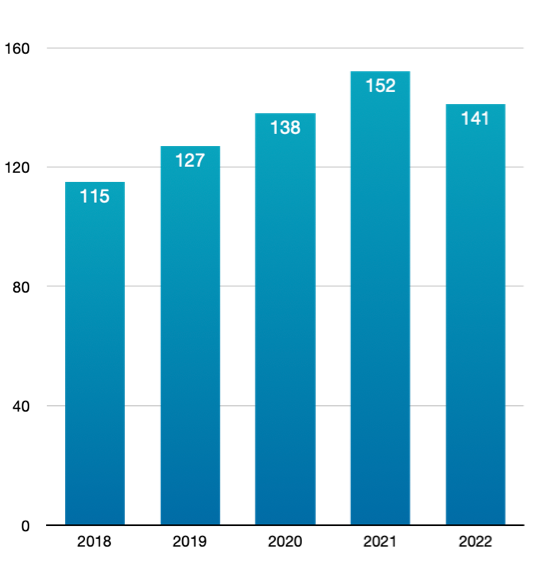
No. of Listings
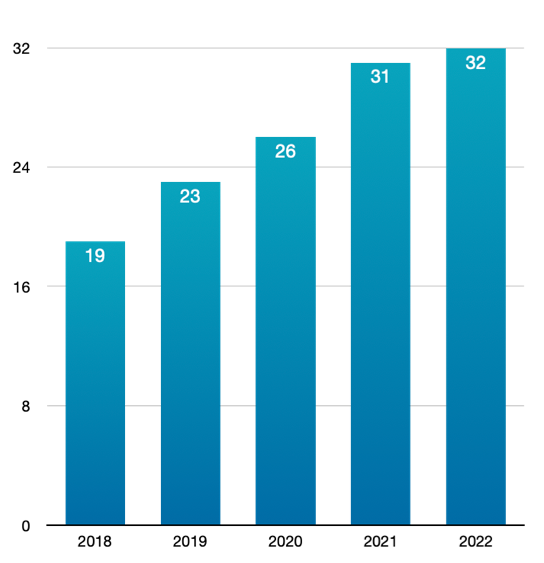
FTSE Nasdaq Dubai UAE 20 Index
The index dropped 6.9% over the year to 3,988.85 at the end of 2022 from 4,284.7 at the end of 2021. It tracks liquid stocks listed on UAE stock exchanges.
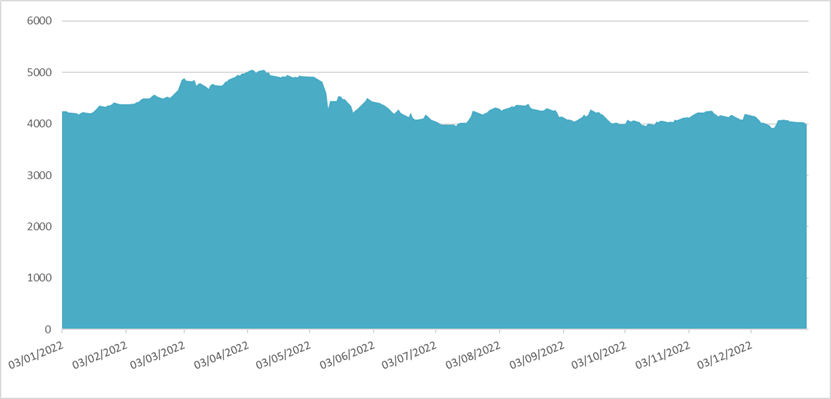
MEMBERS’ MARKET SHARE BY VALUE OF EQUITIES TRADED 2022
Most active 10 members by % traded value
Sukuk Listings
Bond Listings
Chairman's Message

ABDUL WAHED AL FAHIM
Propelling growth engines
As the international financial exchange in the region providing various market participants with world-class market infrastructure and regulations, Nasdaq Dubai continuously aligns its growth strategy with Dubai’s strategic objectives at various levels including advancing the Emirate’s position as dynamic capital markets’ hub, supporting the growth of sustainable finance, immersing international best practices, and creating a sound and constructive ecosystem for capital markets’ transformation.
Based in the Dubai International Financial Centre (DIFC), one of the leading financial centers globally with global banks, asset management companies and financial services’ providers, Nasdaq Dubai has successfully developed a comprehensive ecosystem over the past years that meets and exceeds the requirements of local, regional and international issuers, investors and other capital market participants. The exchange has witnessed sizable progress in its various markets and asset classes.
In 2022, Nasdaq Dubai accelerated its efforts to reinforce Dubai’s position as a driving force for capital markets’ transformation globally. In fact, Dubai is rapidly becoming central in digital assets thanks to developing an appealing regulatory framework that attracts leading global players in the new economy sector. By listing 21Shares’s Physically Backed Bitcoin ETP on Nasdaq Dubai in 2022, we further enhanced our product offering in this asset class and we are planning to carry on with our plans to list similar products in future to create a robust market for crypto-linked financial products.
Meanwhile, Nasdaq Dubai’s fixed income market maintained its buoyancy during the year 2022, strengthening Dubai’s status as one of the leading listing venues globally for bonds and Sukuk. The exchange welcomed 22 issuances of bonds with a total value of US$ 9 billion and 9 Sukuk issuances with a total value of US$ 8.7 billion pushing the total value of debt instruments listed on Nasdaq Dubai to US$ 111.8 billion by the year end.
Nasdaq Dubai is working relentlessly to diversify investment opportunities and asset classes including equity and equity futures, fixed income issuances, innovative financial products, and digital assets as well as attracting new listings to its Main Market, Growth Market for SMEs, and Private Market. We are also aligning our efforts with the UAE’s green economy strategy and efforts to reach Net Zero by 2050, by empowering sustainable and green finance sector. At the end of 2022, total value of sustainability and ESG related issuances listed on Nasdaq Dubai was US$ 16.8 billion.
Nasdaq Dubai is well-positioned for further achievements by playing an integral part in implementing Dubai’s strategy to develop its capital markets in line with the vision of His Highness Sheikh Mohammed bin Rashid Al Maktoum, Vice President and Prime Minister of the UAE and Ruler of Dubai, and under the supervision of Sheikh Maktoum bin Mohammed bin Rashid Al Maktoum, Deputy Ruler of Dubai, Deputy Prime Minister and Minister of Finance, Chairman of the Higher Committee for the Development of Financial Markets and Exchanges in Dubai. To realize the strategic objectives, we are continuously streamlining investors’ access to Nasdaq Dubai and have created a favorable marketplace that propels growth. Nasdaq Dubai’s flexible listing framework provides business owners with various listing options to meet their requirements based on company size, growth stage, owners’ objectives, and jurisdiction.
Business Review

HAMED ALI
Nasdaq Dubai and Dubai Financial Market
In 2022 listing of bonds and Sukuk on Nasdaq Dubai further strengthened Dubai’s position amongst the leading listing venues for fixed income issuances globally. Nasdaq Dubai also made great strides to reinforce its leadership in capital markets’ digital transformation and empowering the new economy in the region as part of Dubai’s strategy to be the global hub of new economy sectors with virtual assets at the forefront. The listing of crypto-backed ETP from 21Shares added further impetus to this new asset class on the exchange, supported by a state-of-the-art market infrastructure and regulations. These efforts are part of a broader strategy to diversify Nasdaq Dubai’s product offering and asset classes. During 2022, we also accelerated our efforts in cooperation with various market participants to enhance market access for our vast investors base that exceeds one million investors from more than 200 countries.
SUKUK and BONDS
Nasdaq Dubai listed 22 bond issuances with a total value of US$ 9 billion and 9 Sukuk issuances with a total value of US$ 8.7 billion. In total, we welcomed 31 new debt listings with a total value of US$ 17.7 billion.
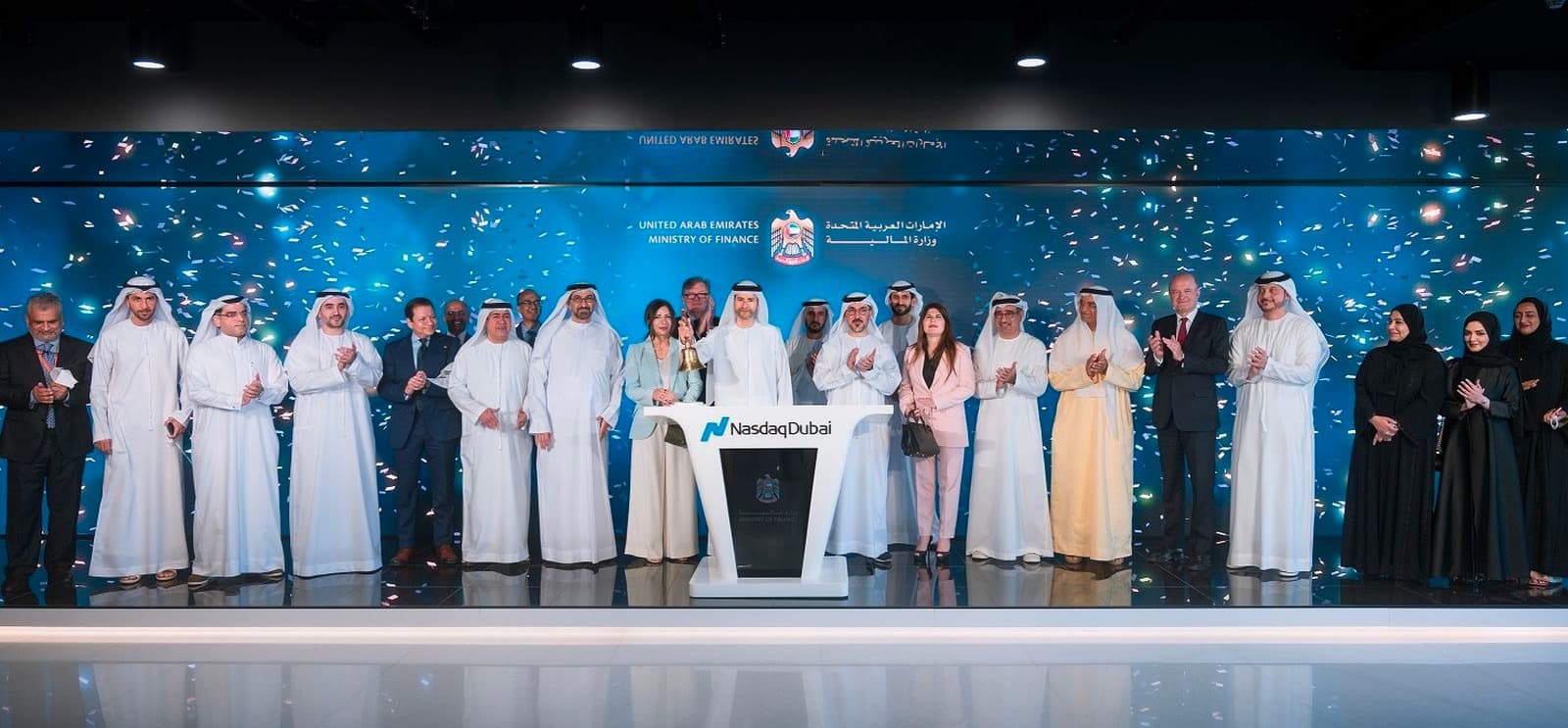
The issuances came from leading sovereign and corporate issuers including the Federal Government of the United Arab Emirates, the Emirate of Sharjah, Dubai Islamic Bank, Capital Bank of Jordan, the Islamic Development Bank (IsDB), Emirates NBD, Industrial and Commercial Bank of China, and Bank of China.

The Federal Government of the United Arab Emirates acting through the Ministry of Finance was the most active sovereign issuer on Nasdaq Dubai through its dollar-denominated Global Medium-Term Note (GMTN) Program as well as the dirham-denominated treasury bonds program. We are pleased to play an instrumental role in implementing the UAE Government’s ambitious strategy to develop the fixed income market, providing investors with lucrative investment opportunities in sovereign issuances and a proper gauge of yield curve of debt instruments’ investments. In 2022, the Federal Government of the UAE has listed 12 Dirham-denominated issuances with a total value of AED 9 billion.
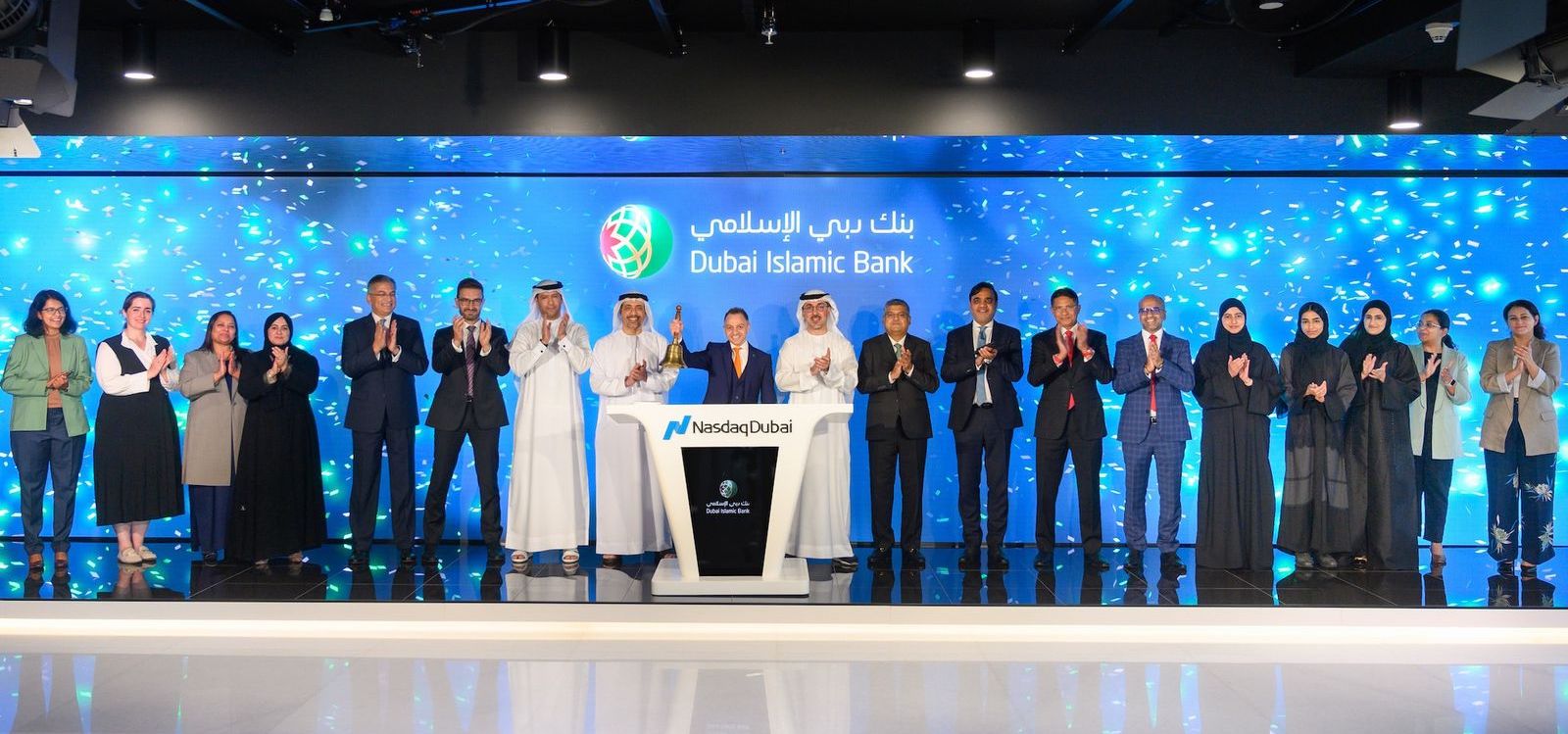
At the end of 2022, total value of debt instruments listed on Nasdaq Dubai reached US$ 111.80 billion, strengthening Dubai’s status as one of the leading listing venues globally for bonds and Sukuk.
We remain enthusiastic about the outlook for fixed-income listings on Nasdaq Dubai despite the global slowdown due to challenging market conditions and monetary tightening cycle led by the US Federal Reserve Bank. Various issuers, sovereign and corporates alike, are poised to regularly tap into the markets to finance development programs and strategic plans, which is expected to accelerate the growth of bonds or Sukuk issuance in addition to other instruments related to green finance and sustainability in medium to long term. This is in line with 2022 Sukuk Perceptions and Forecast Study released by Refinitiv expects Global Sukuk issuances to grow with an estimated CAGR of 6.8% over the next five years reaching US$ 257 billion by 2027.
Funds
In October 2022, 21Shares AG, part of parent company, 21.co, and the world’s largest issuer of cryptocurrency exchange traded products (ETPs), launched the first physically backed bitcoin ETP in the Middle East with the listing of 21Shares Bitcoin ETP on Nasdaq Dubai.
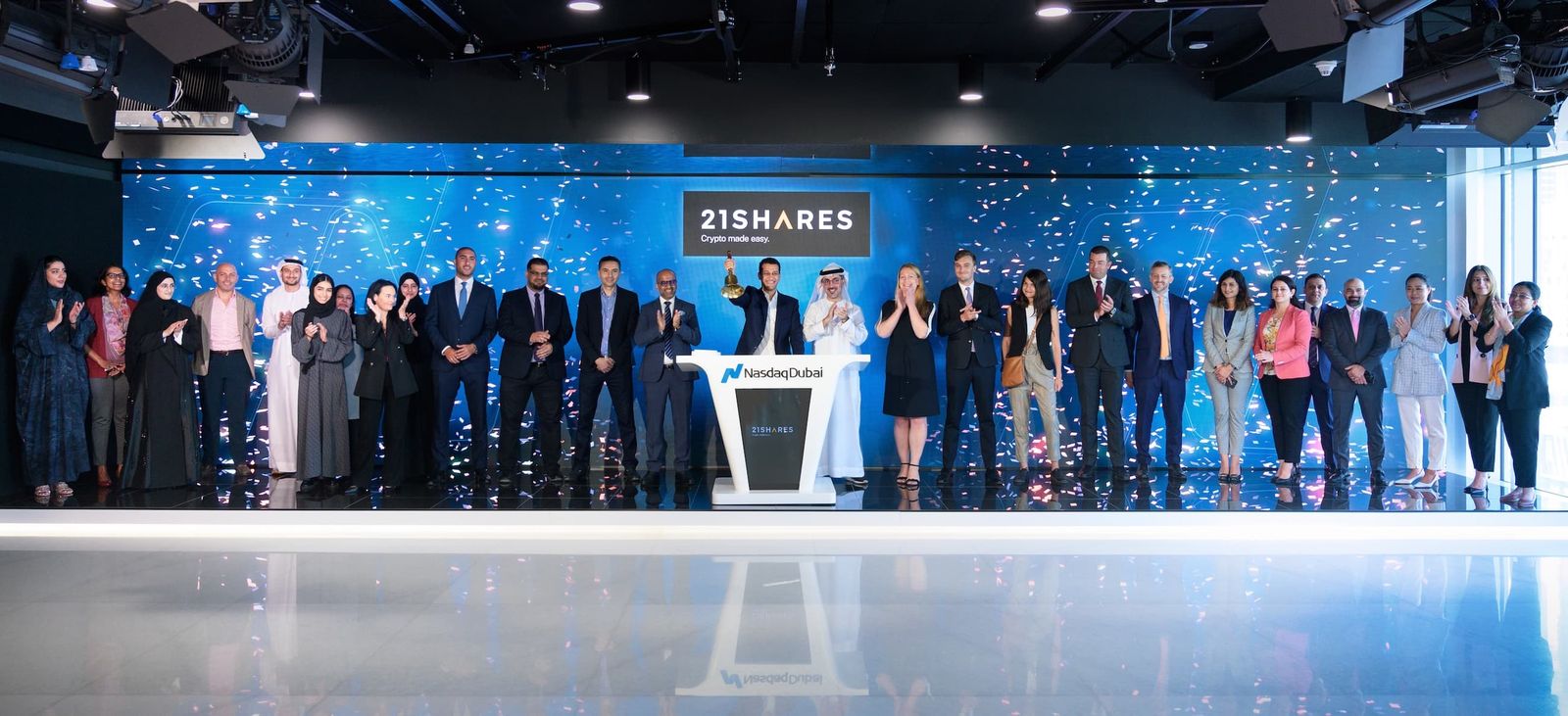
This listing supports the expansion of crypto-linked products traded on Nasdaq Dubai as in 2021 we had listed the Bitcoin Fund of 3iQ Corp., Canada’s largest digital asset investment fund. The listing of products and funds from leading institutions globally underscores their interest to leverage Nasdaq Dubai’s world-class regulatory ecosystem that supports the growth of new economy and digital assets sectors.
Equities
The FTSE NASDAQ DUBAI UAE 20 INDEX, which tracks liquid stocks listed on UAE exchanges, declined by 6.9% during 2022, ending the year at 3,988.9 from 4,284.7 at the end of 2021. The top 5 most active equities members on the exchange by traded value during the year were EFG Hermes UAE, Al Ramz Capital, ENBD Securities, Menacorp Financial Services, and BHM Capital Financial Services respectively.
Thought Leadership and MarketSite
During 2022, Nasdaq Dubai’s MarketSite remained abuzz with numerous webinars, workshops and networking events, as part of our commitment to promote best practices amongst various market participants. Some of the events included:
Look Ahead
As Nasdaq Dubai accelerates the pace of its growth strategy to diversify product offering by expanding the investment opportunities on its various markets as well as further enhancing market access, we are enthusiastic about the year 2023 and beyond. Being at the heart of Dubai’s ambitious strategy to develop its capital markets at various levels including traditional investments as well as the digital assets-related products, signifies the magnitude of fields of progress for the exchange. We are finalizing preparations to launch new products and market segments to respond to the growing demand from issuers and investors. Alongside our successful listing activities of bonds and Sukuk, and equity and equity futures markets, the sustainable, green finance products are poised to play an integral part in our development plans in 2023, in line with the UAE Net Zero strategy and its active role in advocating sustainability globally. Additionally, we plan to vigorously promote new listings from SMEs on Nasdaq Dubai’s Growth Market leveraging its flexible listing framework.
CORPORATE GOVERNANCE
Board of Directors
At the foundation of a well-governed company is an effective Board that provides good leadership, strategic guidance, and oversight, within a framework of prudent and effective controls that enable risk to be assessed and managed.
The Nasdaq Dubai Board is committed to the highest standards of corporate governance and business integrity. The Board continues to ensure that we adhere to the best governance principles and practices.
The Nasdaq Dubai Board represents and acts on behalf of its shareholders, Dubai Financial Market and Borse Dubai, and is committed to strong corporate governance policies, practices and procedures designed to make the Board more effective in exercising its oversight role for achieving the Company’s strategic objectives and for the stewardship of the Company’s resources. The Board adopts the view that corporate governance should promote good performance and integrity as well as conformance with legislation and that effective governance practices enhance the Company’s ability to achieve its strategy and sustainable success.
While the Board does not have responsibility for day to day management of the Company, it stays informed about the Company’s business and provides guidance to the management through periodic meetings and other interactions. In accordance with good governance practice, the roles of Chairman and Chief Executive are distinct and separate with a clear division of responsibilities. This separation of roles promotes more effective communication channels for the Board to express its views on Management. The Chairman presides over meetings and is responsible for the running and leadership of the Board and ensuring its effectiveness. The Chief Executive has delegated authority from the Board and is responsible to the Board for managing the Company’s business. We believe that this separation of roles and allocation of distinct responsibilities to each role facilitates communication between senior management and the full Board about issues such as corporate governance, succession planning, executive compensation and Company’s performance.
The Board has adopted a formal schedule of matters specifically reserved for its decision-making, which includes the annual budget, strategy and long term business objectives, major projects and contracts and significant capital expenditure. The Board has created three Committees to ensure effective and efficient Board operations in accordance with their respective Charters.
During the financial year, the Board met on 5 occasions. The Board has continued to oversee the Company’s strategy, risk framework and financial performance. The Board uses Nasdaq’s online board portal, Directors Desk, for its meetings, which makes the board process efficient and has the benefit of considerable savings in resources, paper and printing.
The Nasdaq Dubai Board comprises 6 Non-Executive Directors including the Chairman, Abdul Wahed Al Fahim. Biographical details of the Directors and the Committees on which they serve are set out below. The biographies demonstrate a wide range of experience and skills, including leadership and knowledge of corporate governance requirements and practices, enabling the Board members to discharge their responsibilities and to bring independent judgment on matters of strategy, performance and standards of conduct which are important to the success of the exchange.

Abdul Wahed Al Fahim
Chairman

Edward S. Knight

H. E. Essa Kazim

George Möller

Jamal Nasser Lootah

Rashid Al Shamsi
Board Charter
Nasdaq Dubai’s governance framework is set out in its Board Charter. The Charter details the corporate governance framework, coordinates and aligns supporting policy documents and establishes an environment that enables the Board and officers of Nasdaq Dubai to meet their responsibilities under the prevailing law and to demonstrate good governance practices.
NON-EXECUTIVE DIRECTORS / INDEPENDENCE
In accordance with Dubai Financial Services Authority (DFSA) Authorised Market Institution regulation and the Articles of Association, a sufficient number of Board members should be Independent Non-Executive Directors. The Non-Executive Directors, four of whom are Independent, bring wide and varied commercial experience to the deliberations of the Board and its Committees.
An assessment of Directors’ independence is carried out on an ongoing basis and at appointment for new Directors. Each Director discloses their status i.e. independent or connected and has the opportunity to disclose changes in external directorships and other potential conflicts of interest. The Board ensures that there are sufficient number of Independent members at all times. The assessment was reviewed by the Nomination and Remuneration Committee and its recommendations were made to the Board for its approval.
A third of the Non-Executive Directors are subject to annual re-election by the shareholders at the Annual General Meeting. In relation to Board remuneration, they receive an annual retainer together with meeting attendance fees for Board and Committee meetings.
Board & Committee Meetings 2022
The Board held five scheduled meetings. A table of Board and Committee meeting attendance is set out below. Comprehensive Board and Committee papers, comprising an agenda and formal reports and briefing papers are sent to Directors in advance of each meeting. Each meeting includes a wide-ranging report from the Chief Executive, a report on Nasdaq Dubai’s financial performance and reports from the committees’ chairmen.
During the year, the Board considered the following matters:
- The review and approval of year 2021 results,
- Appointment of external auditors for year 2022
- Amendments to Authority Matrix, Risk Management Framework, Personal Trading Policy and Procedures for Board Members and Employees
- Incident Escalation Policy
- Fee revision
- Annual AML Return and
- Budget 2023
Board AttendAnce
BOARD COMMITTEES
Board Committees play an important role in the governance process and assist the Board in discharging its duties.
The standing Committees of the Board include: The Audit and Risk Management Committee, the Market Oversight Committee and the Nomination and Remuneration Committee. The Chair of each Committee reports to the Board on actions taken at each meeting. Each Committee has the authority to retain independent advisers. Each Committee has its own Charter, providing written terms of reference that define its authorities, duties and membership. In line with good practice, membership of the Committees is entirely non-executive, and the majority are independent Directors.
AUDIT AND RISK MANAGEMENT COMMITTEE
The Audit and Risk Management Committee is chaired by Jamal Nasser Lootah. The other members are Abdul Wahed Al Fahim and George Möller. The company secretary acts as secretary to the Committee. The Committee is responsible for the independent and objective oversight of internal control and risk management, internal compliance, governance issues, financial reporting, external and internal auditors and financial controls.
During the year, the Committee met on 5 occasions. The Committee reviewed the annual budget, regular finance reports and the annual financial statements. The Committee recommended the annual budget, the annual financial statements and the external auditor for the year 2022 to the Board for approval. The Committee met with the independent external auditors, PricewaterhouseCoopers, to consider the results of the annual audit and to review the annual financial statements for the year 2021. The Committee reviewed the risk management reports from Market Operations and approved the Annual AML Return. The Internal Audit function, which is provided by Dubai Financial Market, met regularly with the Committee, which received the Annual Internal Audit Plan for year 2023, progress on Internal Audit together with the Internal Audit reports following the completion of each audit. The Committee received the audit report from Financial Audit Authority on Market Operations and Risk. The Committee reviewed and recommended the Escalation Policy and amendments to the Authority Matrix, minimum trading fee, Risk Management Framework, Personal Trading Policy for Board Directors and Employees.
MARKET OVERSIGHT COMMITTEE
The Market Oversight Committee is chaired by George Möller. The other members are Abdul Wahed Al Fahim and Edward Knight. The company secretary acts as secretary to the Committee. The Committee is responsible for the independent oversight of Market Regulations which includes Issuer & Market Surveillance and Anti Money Laundering & Compliance functions. It also supervises the regulatory functions carried out by other areas of Nasdaq Dubai, including the application of the exchange’s Rules, Members' conduct of business and the clearing and settlement function.
During the year, the Committee met on 5 occasions. The Committee met on each occasion with Compliance and received updates on regulatory and compliance matters, including feedback on regular meetings with the DFSA. The Committee also received reports on any market incidents as part of its regulatory oversight function. The Committee reviewed and approved the annual member compliance report for the year 2021 and plan for the year 2022. The Committee recommended for Board approval the extension of term of Practitioner Committee members. The Committee reviewed the annual budget including resources for the Market Regulation team.
NOMINATION AND REMUNERATION COMMITTEE
The Nomination and Remuneration Committee is chaired by Rashid Al Shamsi. The other members are Abdul Wahed Al Fahim and Jamal Nasser Lootah. The company secretary acts as secretary to the Committee. The Committee is responsible for new appointments to the Board, succession planning for the Board and executive management and reviewing the independence of Directors. It is also responsible for recommending Non-Executive Directors remuneration for Board approval, approving performance measures and target setting for the Chief Executive and broad policies and programs for employee benefits.
During the year, the Committee met on 4 occasions. The Committee reviewed Director Independence, the Human Capital annual budget and set the targets and objectives for the Chief Executive. The Committee receives regular reports from Human Capital on key matters.
INTERNAL CONTROL AND RISK MANAGEMENT
Internal control aims to ensure that processes and controls are in place to achieve Nasdaq Dubai’s business objectives. Internal audit provides assurances that these processes and controls are effective and being complied with on an ongoing basis. Through risk management, Nasdaq Dubai is able to identify, understand, manage, and mitigate risks to its business in order to reduce the probability that those corporate objectives are jeopardised by unforeseen events.
INTERNAL CONTROL
The Board has overall responsibility for ensuring that Management maintains an adequate and effective system of internal control and for reviewing its adequacy and effectiveness on an ongoing basis. Such a system is designed to support the identification and management of risks affecting Nasdaq Dubai and the business environment in which it operates. Nasdaq Dubai operates a system of internal control which provides reasonable assurance of effective and efficient operations covering all controls, including financial and operational controls and compliance with laws and regulations. Processes are in place for identifying, evaluating, managing, and mitigating risks that may face the exchange. The Board, through the Audit and Risk Management Committee (ARMC), regularly reviews these processes. The ARMC is responsible for the independent and objective oversight of Nasdaq Dubai’s internal control and risk management systems, internal compliance, governance issues, financial reporting, external and internal auditors and financial controls. Additionally, the adequacy and effectiveness of controls is periodically reviewed within the business areas. Regular reports are made to the ARMC by Management, Internal Audit, Risk Officer and Compliance covering matters such as financial controls, compliance and operational controls. The ARMC monitors resolution of any identified control issues of significance through to a satisfactory conclusion.
Management is responsible for establishing and maintaining adequate internal control over financial reporting. In accordance with International Financial Reporting Standards (IFRS), the internal control over financial reporting is a process designed under the supervision of the Chief Executive and the Chief Financial Officer to provide reasonable assurance regarding the reliability of financial reporting and the preparation of financial statements for external reporting purposes.
Nasdaq Dubai’s internal control over financial reporting includes policies and procedures to provide for the maintenance of records that, in reasonable detail, accurately and fairly reflect transactions and dispositions of assets; provide reasonable assurances that transactions are recorded as necessary to permit preparation of financial statements in accordance with IFRS and that receipts and expenditures are being made only in accordance with authorisations of Management and the Board; and provide reasonable assurance regarding prevention or timely detection of unauthorised acquisition, use or disposition of the Company’s assets that could have a material effect on the consolidated financial statements.
Management assesses the effectiveness of internal controls to satisfy itself that the processes followed are effective. The system of internal financial and operational controls is also subject to regulatory oversight by the DFSA.
The purpose of the Internal Audit function is to assist the Board and Management in the effective discharge of their fiduciary and administrative responsibilities by providing independent, objective assurance and consulting services with respect to evaluating risk management, control, and governance process. To ensure independence and objectivity, Internal Audit reports directly to the ARMC. For administrative matters, the Head of Internal Audit has a secondary reporting line to the Chief Executive Officer. The Internal Audit function adopts standards issued by the Institute of Internal Audit (IIA). Internal Audit services are provided by Dubai Financial Market which follows a risk-based audit approach. An annual risk based internal audit plan is prepared based on the rating of following criteria; in addition to management request and required mandatory audits;
- Criticality/Materiality;
- Complexity;
- Inherent risk;
- Extent of change;
- Time since last audit;
- Fraud potential.
All key areas subject to high and/or medium risks such as compliance, financial, information technology and operations are included in the plan while the non-priority and low risk areas are excluded or to be considered later depending on circumstances. During the planning process key business areas and operational risks are identified, compiled, risk rated and ranked to draw a final risk assessed audit scope of work that factors in high and medium risk areas. The audit plan, submitted to the ARMC for approval, provides information about the risk assessment, the current order of priority of audit projects and how they are to be carried out. The audit plan outlines the key departments, activities and processes to audit and estimated start dates and completion timelines as well resources dedicated for the audit. Internal Audit submits regular activity reports to the ARMC and Management summarizing the results of the audit assignment including significant risk exposures and control issues and follow up on the issues raised in the audit report. Internal Audit liaises regularly with internal stakeholders to maintain and uphold communication and relationships to a high level. The key internal stakeholders include compliance, company secretariat and risk management functions.
RISK MANAGEMENT
Risk management is a systematic and continuous process that revolves around defining and identifying risks in each department, measuring, monitoring, managing and reporting significant risks to which Nasdaq Dubai may be exposed. Nasdaq Dubai has established a Risk Management Framework (RMF) to ensure that the exchange continues to be a stable, credible, and reliable organisation that manages all potential risks to its stakeholders. Nasdaq Dubai has a Risk Officer with overall responsibility for the risk management function in relation to the activities carried out by the exchange and for overseeing the implementation of the RMF. The Head of Department within each unit and function is responsible for establishing and maintaining pertinent risk management. The functions and systems for internal control and internal audit are part of the overall risk management process.
Nasdaq Dubai’s Exchange, Clearing and Central Securities Depository operations place significant emphasis on managing risk, including business continuity and default management. Nasdaq Dubai’s RMF is subject to specific regulation and supervision by the DFSA. In operating a Clearing House, Nasdaq Dubai acts as the Central Counterparty (CCP) to transactions executed on the Exchange between Member firms. As a CCP, Nasdaq Dubai is exposed to various clearing related risks, including Counterparty Risk, Credit Risk and Liquidity Risk. The Head of Market Operations in consultation with the Risk Officer, is responsible for implementing the Board’s strategy for identifying, monitoring, managing and mitigating these risks. One primary risk management tool is the requirement placed on Clearing Members to provide margin payments and collateral to Nasdaq Dubai in accordance with its Business Rules. In addition to the collateralisation of obligations, other risk management tools adopted by the Board include rigorous Clearing Membership standards, dedicated clearing capital, netting arrangements and advanced risk management monitoring techniques.
CORPORATE RESPONSIBILITY
In line with the undisputed commitment to play an active role in promoting the Environment, Social and Governance (ESG) best practices, Nasdaq Dubai has accelerated its efforts to instill these ESG practices within its various processes, operations, and activities. We have also expanded the scope of cooperation with various stakeholders to promote the adoption of ESG framework.
The implementation of ESG best practices is led by the clear guidance from Nasdaq Dubai’s Board of Directors that accentuates on rigorous devotion to act as a responsible exchange at the heart of Dubai’s accelerating efforts to promote sustainable and green finance as well as the UAE’s aim to become a Zero Carbon country by 2050.
Starting with our most valuable asset, Nasdaq Dubai is committed to attracting, developing, and retaining the skills we need to deliver our strategic objectives as our people are at the heart of what we do and drive the success of our business. Nasdaq Dubai also maintains its focus on providing an inclusive and healthy work environment that promotes equality.
Employees are required to comply with the company’s Code of Ethics and Conduct. Although Nasdaq Dubai does not have a high environmental impact, our employees are encouraged to observe environmental protection. During the year 2022, we have boosted our commitment to paperless work environment by taking big strides towards responsible printing, reducing the number of printers within the organization, and restricting printing to crucial requirements.
On the broader level of capital markets and economic development, Nasdaq Dubai is actively promoting best practices of Corporate Governance and transparency amongst various market participants. It also promotes sustainable finance and supports the transition towards sustainable economy by creating a favorable framework for issuance and listing of sustainability-related financial instruments. One of our most recent market activities on this front is the US$ 2.7 billion carbon-neutrality-themed bonds from the Industrial and Commercial Bank of China Limited (ICBC), the world’s largest bank by assets, which expands the sustainable and green investment opportunities and reinforce Dubai’s leading position as a sustainable finance hub.
Nasdaq Dubai is also a dynamic member of the UAE Sustainable Finance Working Group (SFWG) and has participated in the Group’s various activities in 2022 including the issuance of its second public statement ‘2022 Public Statement on Collaboration on Sustainable Finance in the UAE’.





